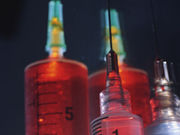Liraglutide also significantly reduces mean body weight, daily insulin dose; increases quality of life
MONDAY, Aug. 15, 2016 (HealthDay News) — Liraglutide added to capped insulin is associated with reductions in glycated hemoglobin (HbA1c), body weight, and insulin requirements, according to a study published online Aug. 4 in Diabetes Care.
Bo Ahrén, M.D., from Lund University in Sweden, and colleagues conducted a 26-week study to examine the efficacy and safety of liraglutide added to capped insulin doses. A total of 835 subjects were enrolled and randomized in a 3:1 ratio to once-daily subcutaneous liraglutide (1.8, 1.2, and 0.6 mg) or placebo added to an individually capped daily dose of insulin.
The researchers observed a significant decrease in mean baseline HbA1c with liraglutide versus placebo at week 26 (−0.33, −0.22, and −0.23, respectively, versus 0.01 percent). Liraglutide correlated with significant reductions in mean body weight versus placebo (−5.1, −4.0, and −2.5, respectively, versus −0.2 kg). For liraglutide versus placebo there were significant reductions in daily insulin dose and increases in quality of life. Higher rates of symptomatic hypoglycemia were seen for liraglutide 1.2 mg versus placebo (21.3 versus 16.6 events/patient/year; P = 0.03); there were higher rates of hyperglycemia with ketosis for liraglutide 1.8 mg versus placebo (0.5 versus 0.1 events/patient/year; P = 0.01).
“Liraglutide added to capped insulin reduced HbA1c, body weight, and insulin requirements but with higher rates of hypoglycemia for liraglutide 1.2 mg and hyperglycemia with ketosis for liraglutide 1.8 mg,” the authors write.
Several authors disclosed financial ties to pharmaceutical companies, including Novo Nordisk, which manufactures liraglutide and funded the study.
Full Text (subscription or payment may be required)
Copyright © 2016 HealthDay. All rights reserved.








